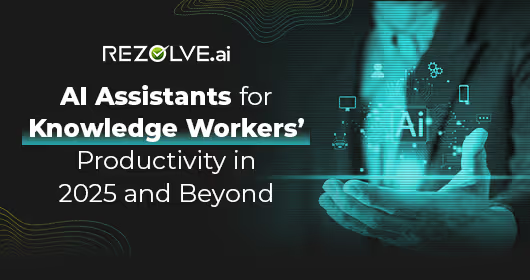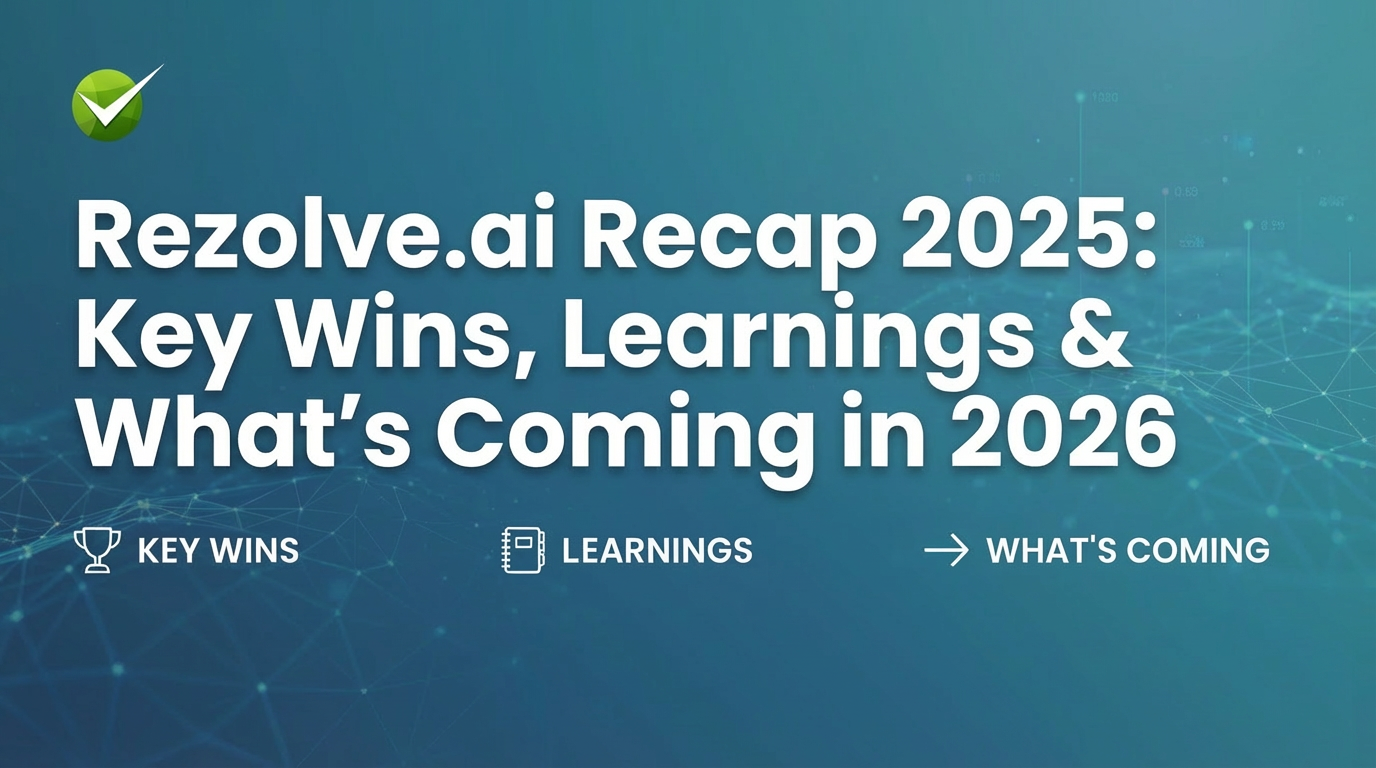If you’ve worked with AI-powered assistants in the last few years, you’ve likely experienced a paradox—while they’re helpful, they often require just as much handholding as they prevent. In 2025 and beyond, that’s going to change.
AI assistants have already embedded themselves into the modern workplace, but we’re only scratching the surface of what’s possible. Today, they mostly automate repetitive tasks—answering basic emails, scheduling meetings, summarizing reports. But the next generation of AI assistants will be proactive, context-aware, and capable of deeper collaboration with human workers. They will no longer just ‘assist’ in the traditional sense but rather augment human cognition, allowing knowledge workers to focus on creativity, strategy, and high-value decision-making.
.avif)
Knowledge workers—consultants, analysts, engineers, designers, researchers, and marketers—rely on information. They need it fast, in context, and with precision. AI is uniquely positioned to become an extension of their expertise, allowing them to navigate the increasing complexity of modern work.
This isn’t just about saving time. It’s about fundamentally changing how work happens. As AI assistants evolve, they will transition from being productivity enhancers to cognitive co-pilots—enabling seamless human-AI collaboration. Let’s explore how they’re reshaping the productivity landscape and what the future holds.
The Knowledge Work Revolution: Why AI Assistants Are Critical
.avif)
Knowledge workers are the backbone of modern economies. They analyze data, develop strategies, solve complex problems, and make decisions that drive businesses forward. Unlike manual laborers, they deal with intellectual rather than physical tasks.
However, their biggest challenge is not a lack of intelligence—it’s the sheer volume of data they must sift through to make informed decisions. The modern knowledge worker drowns in information, spends hours on administrative tasks, and faces decision fatigue due to cognitive overload. Some key issues they grapple with include:
- Information Overload: The human brain can only process so much. With thousands of emails, reports, Slack messages, and documents piling up, knowledge workers spend more time managing information than acting on it.
- Repetitive Tasks: Scheduling meetings, responding to routine queries, and filling out reports consume hours that could be spent on high-value work.
- Decision Fatigue: When faced with too many decisions daily, cognitive resources get depleted, leading to poor judgment and burnout.
- Fragmented Workflows: Modern work is scattered across dozens of apps, making it harder to focus and get things done efficiently.
AI Assistants are Already Changing Productivity
AI assistants aren’t new. They’ve been evolving in the background, subtly optimizing workflows. Early versions—like Microsoft Clippy—were rudimentary, offering suggestions with little understanding of user needs. Then came Google Assistant, Siri, and Alexa, which made AI more interactive but still lacked deep workplace integration.
Now, we have AI assistants that can summarize documents, auto-generate meeting notes, and even write content. Tools like ChatGPT, Notion AI, and Microsoft Copilot are setting new standards in how AI can augment human work. And yet, despite these advancements, they remain reactive rather than proactive. They require explicit prompts, don’t always understand context, and can’t truly function as independent collaborators.
But that’s about to change. By 2025, AI assistants will no longer be just ‘helpers’—they will be embedded into workflows, anticipate needs, and actively improve decision-making.
What Will AI Assistants Look Like in 2025?
.avif)
If AI assistants are going to be more than glorified chatbots, they need to evolve into something more dynamic, adaptive, and intelligent. Here’s how they’re expected to transform in the coming years:
From Simple Automation to Proactive AI
The AI assistants of 2025 won’t just wait for commands—they’ll predict what you need before you ask. Imagine an AI that:
- Prepares your daily schedule based on priorities and meetings.
- Flags important emails before you even check your inbox.
- Suggests potential risks in a project before they arise.
Rather than merely executing tasks, AI will function as an active partner in productivity, reducing cognitive load while enhancing efficiency.
Conversational AI Assistants That Adapt to Your Work Style
Current AI assistants struggle with consistency. They can answer a question in one moment but forget the context in the next. In 2025, AI will master conversational elasticity—meaning it will maintain context across different interactions, remembering your preferences and adjusting accordingly.
For example, an AI assistant that knows how you structure reports will auto-generate drafts that align with your style, not just generic templates. If you prefer concise summaries, it won’t generate lengthy paragraphs unless you ask for them. AI will shape itself around the user rather than forcing users to adapt to AI.
Multimodal Capabilities
Right now, most AI assistants operate through text or voice commands. Soon, they’ll become multimodal, meaning they can process and respond through multiple inputs like:
- Voice commands during meetings.
- Text prompts in emails or messaging apps.
- Visual inputs (e.g., extracting data from a photo of handwritten notes).
- Gestures and haptic feedback (for hands-free interaction in certain environments).
The result? A seamless and intuitive way of interacting with AI, blurring the line between digital and human collaboration.
Real-Time Learning
One of the biggest shortcomings of AI today is its static nature. AI tools often need to be re-trained or manually updated to improve performance. By 2025, AI assistants will feature real-time learning, adapting dynamically to:
- Individual user preferences and habits.
- Shifting business priorities.
- Industry-specific trends and data changes.
Imagine an AI that evolves as you do—learning how you work, refining its recommendations, and proactively aligning with your professional growth.
Modern AI Assistant’s Role in the Workday
.avif)
How exactly will AI assistants improve daily workflows? Here’s how they’ll reshape productivity:
Retrieving Right Data at the Right Time
Instead of manually searching through emails or project files, AI will surface relevant information instantly. Need the latest financial report? Your AI assistant will fetch it without you leaving your task. Have an important meeting? It will summarize key points from past conversations automatically. In fact, Rezolve.ai has its own proprietary RAG (Retrieval Augmented Generation) algorithm that acts as enterprise search function on its own.
Eliminating Low-Value Tasks
Administrative work kills productivity. AI will take over:
- Scheduling meetings and sending invites.
- Filling out forms and expense reports.
- Generating routine emails and responses.
What used to take hours will now take seconds.
AI as a Meeting Facilitator
Meetings won’t be unproductive anymore. AI will:
- Transcribe discussions and summarize key takeaways.
- Suggest follow-up actions for each participant.
- Provide relevant documents in real time.
Decision Augmentation: AI-Powered Insights
Rather than just providing data, AI will interpret it. Want to know how a strategy will impact revenue? Your AI assistant will forecast outcomes, analyze trends, and suggest the best course of action.
AI That Thinks Ahead of Your Own Schedule
Forget about micromanaging your to-do list. Latest AI Assistants will prioritize tasks based on urgency and deadlines, remind you to prepare for meetings ahead of time and nudge you to take breaks when you’re overworking.
Industry-Specific Impact of AI Assistants
.avif)
Alright, let’s talk about how AI assistants are shaking up different industries. AI isn’t just a fancy office toy anymore—it’s getting embedded into workflows in ways we couldn’t have imagined a decade ago.
Consulting & Analytics – AI as Your Research Partner
If you’ve ever worked in consulting or data analytics, you know the pain of sifting through mountains of reports, trend data, and case studies just to extract a few key insights. AI assistants in 2025? They’ll do the heavy lifting. Think of AI that can comb through endless PDFs, pull the relevant insights, and even generate reports with actionable recommendations. You’ll get to focus on strategy rather than data cleanup.
Marketing & Content Creation – Your AI-Powered Brainstorming Buddy
Marketers let’s be real. Churning out fresh content ideas, writing compelling copy, and running campaigns takes serious mental energy. AI assistants will step in to refine your messaging, suggest ad variations based on audience behavior, and even auto-generate blog posts (but in a way that actually sounds human). AI won’t replace creative directors, but it’ll definitely save them hours of work.
AI as Debugging Wizard for Software Development
AI-powered coding tools are already making waves (looking at you, GitHub Copilot), but by 2025, AI will become an even better coding sidekick. It’ll predict bugs before they happen, suggest best practices, and help developers write cleaner, more efficient code. Debugging and testing? AI will handle a big chunk of it, letting devs focus on problem-solving and innovation rather than fixing syntax errors.
Agentic AI Assistant for IT Service Management
One area where AI is making a massive difference is ITSM (IT Service Management). Enter Rezolve.ai, one of the top AI assistants built specifically for knowledge workers in IT. Think of it as an IT helpdesk on steroids—integrated right into MS Teams, answering tech questions, automating ticket resolution, and ensuring that IT support is as seamless as possible. Instead of waiting for human support teams to respond, employees can get instant help through conversational AI. This is the kind of automation that actually makes work easier, not just faster.
Healthcare & Law – AI for Compliance and Frontline Support
These industries are bogged down with compliance, paperwork, and never-ending documentation. AI assistants will streamline patient record management, automate legal research, and even handle staff support in real-time. Lawyers and doctors won’t have to spend half their day buried in documents—instead, they’ll have AI doing the grunt work while they focus on decision-making and client interactions.
Ethical and Practical Considerations
.avif)
Now, before we start handing over the keys to AI, let’s talk about some of the ethical and practical concerns. AI isn’t magic—it’s only as good as the data and systems behind it.
But Can AI Be Truly Fair?
AI learns from data. And if that data has biases (which, let’s be honest, it often does), AI can inherit them. We’ve seen AI models favor certain demographics in hiring tools, banking algorithms, and even facial recognition. The challenge for 2025? Making AI assistants transparent and accountable so they don’t reinforce existing inequalities.
This is where Rezolve.ai’s explainability comes in. You will always know why the AI bot did what it did.
Data Privacy & Security
With AI handling sensitive information—whether it’s medical records, legal documents, or enterprise data—there’s always the risk of breaches or misuse. Companies will need robust AI governance in place to ensure compliance with privacy laws (GDPR, anyone?) and make sure AI assistants aren’t storing or sharing data improperly. Enterprise-grade Agentic AI systems like Rezolve.ai are HIPAA and GDPR compliant.
AI as Employee Partner, Not a Replacement
Let’s address the elephant in the room: Will AI take jobs? Short answer: It depends. AI won’t replace humans entirely, but it will reshape jobs. The real challenge will be adapting to new roles where humans and AI work together. Instead of an AI replacing an IT support agent, it’ll help them solve tickets faster. Instead of replacing a marketing team, it’ll supercharge their campaigns.
The best AI assistants won’t be fully autonomous—they’ll be collaborative. AI should enhance human decision-making, not take over. Businesses that succeed in 2025 and beyond will be the ones that balance automation with human expertise. AI can optimize processes, but creativity, empathy, and critical thinking? Those will always be human superpowers.
Preparing for an AI-Enhanced Future
So, how do we actually prepare for this shift? AI is here to stay, and the smartest professionals and businesses will be the ones who lean into the change rather than resist it.
Upskilling for Knowledge Workers with AI Skillset
If you’re a knowledge worker, now’s the time to start learning how to work with AI, not against it. This means:\n- Understanding how AI tools work.\n- Learning how to give AI the best inputs to get quality outputs.\n- Mastering critical thinking and problem-solving, which AI can’t replicate (yet).
Companies will need to train employees to leverage AI tools effectively rather than fearing job displacement. The goal? AI-assisted professionals, not AI-replaced professionals.
Enterprise AI Adoption Strategies
Businesses often make the mistake of implementing AI for AI’s sake. Just because you can automate something doesn’t mean you should. Successful AI adoption in 2025 will be about identifying the right use cases and ensuring employees actually benefit from AI rather than feeling like they’re fighting against a machine.
Regulatory & Ethical Frameworks – The Need for AI Governance
AI adoption isn’t just a tech issue—it’s a policy issue. Governments and enterprises will need to work together to create regulations that ensure AI is fair, secure, and beneficial. We’re already seeing governments draft AI laws, and by 2025, these frameworks will become more crucial than ever.
Closing Note
AI assistants are no longer a futuristic dream—they’re becoming an essential part of how work gets done. Whether it’s marketing, IT, software development, healthcare, or law, AI is stepping in to enhance productivity, not replace the people behind it.
The real key to success in this AI-driven world? Strategic adoption and ethical implementation. Companies that rush AI adoption without proper governance will struggle. Those that take the time to integrate AI intelligently—while keeping human expertise at the center—will thrive.
So, here’s the question: Are you ready to embrace AI as a co-pilot rather than just another tool? Because the future of work isn’t about man vs. machine—it’s about how well the two can work together.
Now’s the time to lean in, adapt, and take productivity to the next level.






.webp)




.jpg)

.png)








.png)